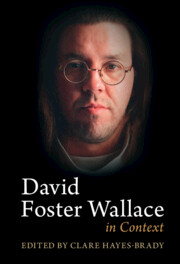Book contents
- David Foster Wallace in Context
- David Foster Wallace in Context
- Copyright page
- Contents
- Figures
- Contributors
- Acknowledgments
- Abbreviations
- Introduction
- Part I Contexts
- Part II Ideas
- Chapter 10 David Foster Wallace and Attention
- Chapter 11 After Analysis
- Chapter 12 Perfectionism and the Ethics of Failure
- Chapter 13 The Pragmatist Possibility in David Foster Wallace’s Writings
- Chapter 14 A Tale of Two Theses
- Chapter 15 Free Will and Determinism
- Chapter 16 David Foster Wallace’s Mathematics of the Infinite
- Chapter 17 David Foster Wallace and Existentialism
- Chapter 18 David Foster Wallace and Religion
- Chapter 19 Mr. Consciousness
- Part III Bodies
- Part IV Systems
- Works by David Foster Wallace
- Bibliography of Secondary Sources
- Index
Chapter 17 - David Foster Wallace and Existentialism
from Part II - Ideas
Published online by Cambridge University Press: 18 November 2022
- David Foster Wallace in Context
- David Foster Wallace in Context
- Copyright page
- Contents
- Figures
- Contributors
- Acknowledgments
- Abbreviations
- Introduction
- Part I Contexts
- Part II Ideas
- Chapter 10 David Foster Wallace and Attention
- Chapter 11 After Analysis
- Chapter 12 Perfectionism and the Ethics of Failure
- Chapter 13 The Pragmatist Possibility in David Foster Wallace’s Writings
- Chapter 14 A Tale of Two Theses
- Chapter 15 Free Will and Determinism
- Chapter 16 David Foster Wallace’s Mathematics of the Infinite
- Chapter 17 David Foster Wallace and Existentialism
- Chapter 18 David Foster Wallace and Religion
- Chapter 19 Mr. Consciousness
- Part III Bodies
- Part IV Systems
- Works by David Foster Wallace
- Bibliography of Secondary Sources
- Index
Summary
The work of David Foster Wallace can be seen to critically renew ideas and concerns from existentialist philosophy and literature. Wallace repeatedly expressed his admiration of existentialist authors, and his fiction contains many explicit and implicit references to their writings. This chapter will provide an overview of the main themes and intertextual connections that Wallace’s work shares with the existentialists, such as a comparison with Sartre’s view of consciousness, Kierkegaard’s critique of irony, and Camus’s relation of meaningful existence to community; also, a brief comparative reading of the opening of Infinite Jest and Kafka’s “The Metamorphosis,” of “The Depressed Person” and Beauvoir’s “The Monologue,” and of “B.I. #20” and Dostoyevsky’s Notes from Underground. Overall, Wallace shares with these authors the conviction that philosophy and literature are partially overlapping activities, that some philosophical problems are best approached through literature, and that their works therefore blur the boundaries between these modes of writing.
- Type
- Chapter
- Information
- David Foster Wallace in Context , pp. 181 - 191Publisher: Cambridge University PressPrint publication year: 2022
- 1
- Cited by



